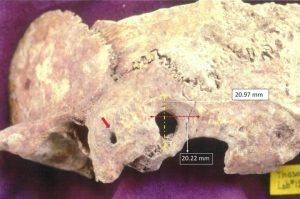Amazing Discovery on Thassos
 A Byzantine-era skull, which has been discovered by anthropologists in the Paliokastro area on Thassos, shows signs of highly complex surgery.
A Byzantine-era skull, which has been discovered by anthropologists in the Paliokastro area on Thassos, shows signs of highly complex surgery.
The skull, which dates from the early Byzantine period, which lasted from the 4-7 century AD, bears traces of surgery that are “incredibly complex,” according to researcher Anagnostis Agelarakis, Ph.D.
The discovery was made by an Adelphi University research team led by Agelarakis. A total of ten skeletons, of four women and six men, were found. They are likely to be persons of high social status, based on the location and architecture of the burial site.
With regard to one male skull, “even despite a grim prognosis, an extensive effort was given to this patient’s surgery. So it’s likely that he was a very important individual to the population at Paliokastro.”
The report also notes that it is likely that the person had an infection that required surgery, while another male patient, presumably an archer, appears to have died shortly after or during the doctor’s attempt to save him.

